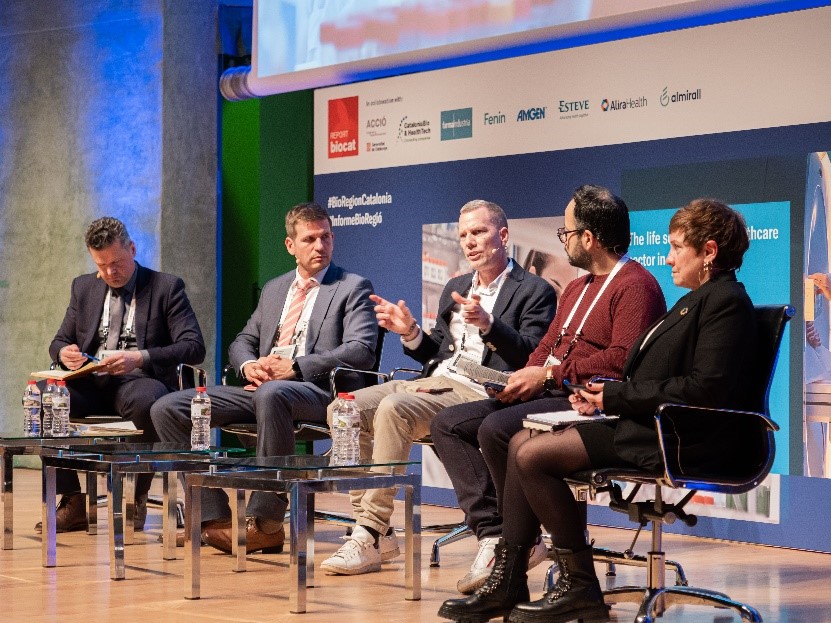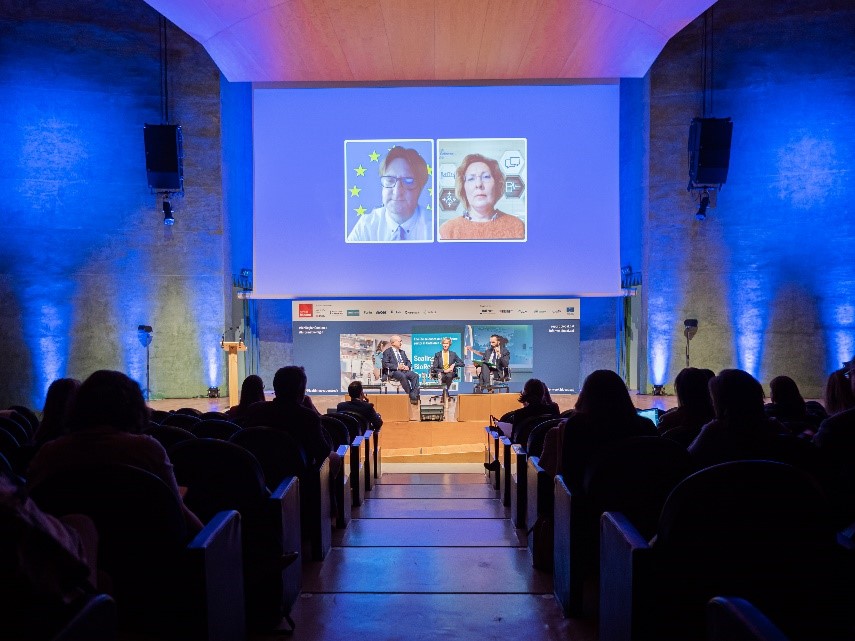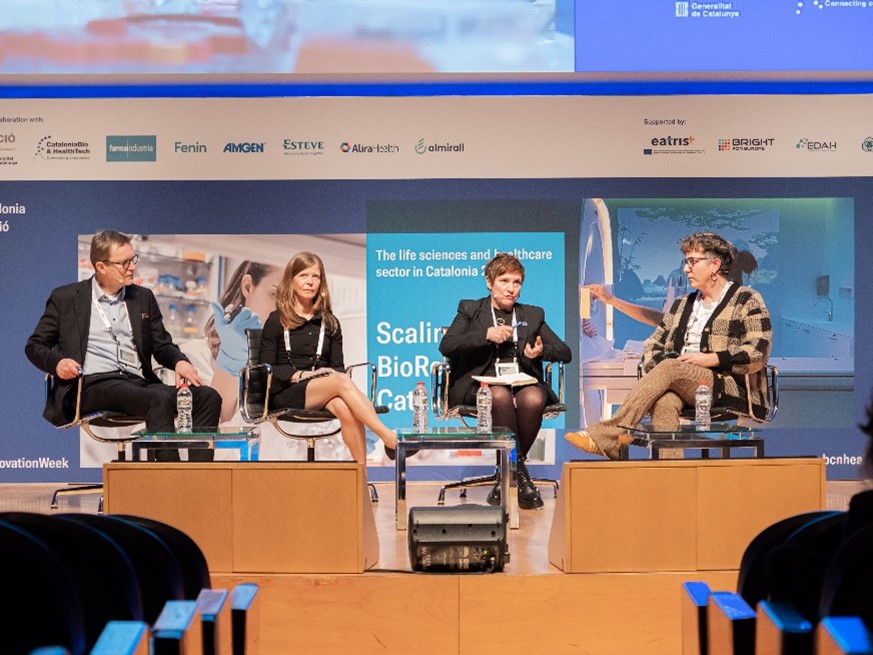European health clusters tackle sector’s main challenges in international framework
<p>The ‘European clusters dialogs for transformation’ brought together more than a hundred experts from the sector to debate the Europe’s challenges in becoming more <strong>resilient, sustainable, circular and regenerative</strong>. The event was held after the <a href="https://www.biocat.cat/en/news/sector-experts-review-main-strategic-cha…; target="_blank">presentation of the 2022 BioRegion of Catalonia Report</a>, as part of the first <a href="https://www.biocat.cat/en/news/catalan-capital-hosts-around-twenty-acti…; target="_blank">Barcelona Health Innovation Week</a>.</p>

Various European health clusters met in Barcelona to debate the challenges Europe has to tackle to become more resilient, sustainable, circular and regenerative. At the event titled ‘European clusters dialogs for transformation’, the participants shared some of the challenges, including digitalization of healthcare systems, opportunities for connections between European clusters to react to future crises, technological independence and productive capacity, the circular economy and the sector’s sustainability.
Digital transformation and reinforcing digital health
The dialogs kicked off with a keynote speech from Szabolcs Szekacs, Digital Industries team leader in the European Commission DGGROW, presenting strategies for contributing to Europe’s digital resilience. Szekacs also took part in the first panel discussion, moderated by Biocat Director of Science Policy and Internationalization Montserrat Daban, with other panelists from three European clusters in Estonia, Sweden and France that are Biocat’s partners in the BRIGHT project. The panelists shared the results of a project, led by Biocat, that aims to drive the digital transformation and learning of new techniques, while promoting long-term collaboration among SMEs, investment funds, support bodies, academic institutions and the administration.
In this context, they all agreed: “Small industry doesn’t have the resources for digitalization and is at a disadvantage compared to big industry, a situation that monopolizes the sector and stops us from building a more resilient Europe.” Nevertheless, they believe the transition of the health sector towards the digital transformation “must be built jointly” and there is an opportunity to do so in mirroring other sectors, such as finance or automotive, which are years ahead.
 From left to right: Björn Arvidsson, STUNS Life Sciences (Sweden); Sohail Nourestani, Eurasanté (France); Sven Parkel, Scan Balt and Connected Health (Estonia); Szabolcs Szekacs, European Commission; and Montserrat Daban, Biocat
From left to right: Björn Arvidsson, STUNS Life Sciences (Sweden); Sohail Nourestani, Eurasanté (France); Sven Parkel, Scan Balt and Connected Health (Estonia); Szabolcs Szekacs, European Commission; and Montserrat Daban, Biocat
Connections among clusters: a key tool for resilience
The second session, titled “Building Resilience: From Clusters to Euroclusters”, discussed the main challenges health clusters are facing in terms of resilience. There are mainly two: the green transition and accelerating digitalization. And to overcome these challenges, building relationships will be key. “It is important to establish good connections among stakeholders and have the right resources at the right time to be able to react competently in the face of adversity.” This interconnection helps make up for weaknesses and mitigate disruptions.
Plus, there was also time to comment on the stability of the production chain and resilience of the industry in tackling new crises. According to the panel of experts, interregional collaboration must be the focus in implementing a strategic plan that ensures the ecosystems are able to react when faced with new crises.

European Clusters Alliance (Brussels); Olga Trofymova, Ukrainian Clusters Alliance; and the moderator Javier Selva, CataloniaBio & HealthTech. On screen, Marek Przeor, European Commission and Karen Lindegaard, Danish Life Sciences Cluster.
Biomanufacturing will help build a more resilient Europe
“The lack of manufacturing in Europe is one of the main problems the continent is facing and keeps it from being truly resilient.” This was the starting point for the session “Sustainable transformation: Biomanufacturing”, where biomanufacturing was lauded as a key tool for ensuring Europe has a more competitive industry that is prepared for crises. “Where we have to focus most is on understanding the industry and how important manufacturing is, because the scientific arena is truly lacking in knowledge of this part of the chain.”
The BioMan4R2 program, which Biocat is taking part in and is coordinated by Turku (Finland), aims to improve manufacturing processes, transfer disruptive medical technology, and boost the competitiveness and sustainability of the European health ecosystem, while encouraging long-term collaboration among SMEs, investment funds, research, clinical and knowledge organizations, science and technology parks and other companies in these sectors.

From left to right, Tero Piispanen, Turku Science Park (Finland); Alexandra Patriksson, Testa Center (Sweden); Montserrat Daban, Biocat; and Anaïs LeCorvec, Council of European BioRegions.
The European health clusters program finished off with an inspiring talk by Laura Roman, Industry 5.0 Policy Officer at DGRESEARCH, European Commission. “We have to commit to a cleaner, more organic industry that is also interconnected and diverse,” she suggested. To reach this point, the speaker highlighted that we need to ensure eco-friendly production, promote ethics, use technology and empower workers. “The future is industry 5.0, which follows these values and provides effective solutions.”
With these sessions, Biocat is working to maximize the impact of innovation generated in the BioRegion and align the organization’s strategy with current European and international trends in the life sciences and healthcare sector. The knowledge from these sessions and collaborations with European stakeholders will help continue work to position the BioRegion as one of the main health innovation hubs in Europe.
If you missed the sessions, you can watch them on the Biocat YouTube channel.
